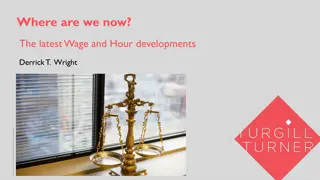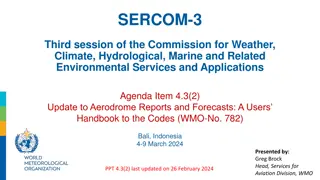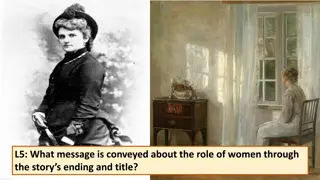
Mississippi Family Law Updates
Stay updated on recent Mississippi family law rulings, including landmark cases like Whittington v. Whittington and Gussio v. Gussio. Learn about alimony, prenuptial agreements, custody jurisdiction, and more. Dive into the legal nuances that shape family law in Mississippi.
Download Presentation

Please find below an Image/Link to download the presentation.
The content on the website is provided AS IS for your information and personal use only. It may not be sold, licensed, or shared on other websites without obtaining consent from the author. If you encounter any issues during the download, it is possible that the publisher has removed the file from their server.
You are allowed to download the files provided on this website for personal or commercial use, subject to the condition that they are used lawfully. All files are the property of their respective owners.
The content on the website is provided AS IS for your information and personal use only. It may not be sold, licensed, or shared on other websites without obtaining consent from the author.
E N D
Presentation Transcript
WHITTINGTON V. WHITTINGTON Guy v. Guy: A spouse who supports the other through school, and whose spouse divorces them shortly after -- before they benefit from the investment -- may recover the amount they paid. Whittington: A husband whose wife left him four years after he paid for her nursing school education was properly awarded $125,000 in reimbursement alimony.
A wife of 9 years, in her 30s, was awarded $250,000 in lump sum alimony from her husband, who had $4 million in property made separate by their prenuptial agreement. GUSSIO V. GUSSIO Note: A prenuptial agreement that waives property division but not alimony may lead to a substantial lump sum award resembling property division.
Pre-2017: Unless a cohabitant proved that their cohabitation was not accompanied by mutual financial support, the alimony terminated. GILLENWATER V. GILLENWATER Gillenwater: Chancellors should use the Armstrong factors to determine whether cohabitation affects the need for alimony. The alimony may be modified or terminated.
Cheatham v. Cheatham established factors for awarding a homemaker spouse lump sum alimony prior to the adoption of equitable distribution. The decision used factors similar to those adopted in Ferguson for division of assets. CASSEL V. CASSEL In Cassel v. Cassel (Miss. June 20, 2024) the Mississippi Supreme Court held that the Cheatham factors should not be used for awarding lump sum alimony courts should use the Armstrong alimony factors.
DALY V. RAINES Mississippi had jurisdiction to modify a custody order even though the mother and father had moved. The child was living with the maternal grandparents in Mississippi after the mother took her to Florida for eight months. Note: Under the UCCJEA, temporary absences do not alter a child s home state. Note: If the child has no home state, a state with significant connections to the action may take jurisdiction.
A temporary custody order may become a de facto permanent order, requiring the noncustodial parent to prove a material, adverse change in circumstances. Hendrix v. Whit: An out-of-court custody agreement cannot be converted to a de facto permanent order. Thirteen months is too short a time to convert a temporary order to a permanent order. TEMPORARY CUSTODY
Litton: Parents agreement that a father would be a tie-breaker for extracurricular activities included camp it was described as extracurricular and was not excluded. JOINT PARENTAL DECISION-MAKING Note: A chancellor may override a tie- breaker parent s decision if they find that the decision was not in the child s best interest. Hills: When joint legal custodians cannot agree, the court will usually assign decision-making to the custodial parent.
ADVERSE IMPACT ON CHILD Modification requires the noncustodial parent to prove a material change in the custodial parent s home that has adversely impacted the child. Note: It is hard to predict whether a chancellor will find adverse impact when a child has been exposed to adverse circumstances but appears to be thriving.
WHEN IS RELOCATION A MATERIAL ADVERSE CHANGE? A move by a sole physical custodian is not in itself an adverse material change in circumstances. The noncustodial parent may be unable to prove a material change to reach a best interest analysis. When a joint physical custodian moves, the move makes the custody arrangement unworkable, creating a material change in circumstances. Under Albright, the parent who is not relocating may be favored.
The court of appeals affirmed a chancellor s order refusing to modify joint physical custody when a military father was relocated from Mississippi to Colorado. SCOTT V. BOUDREAU However, the court held that the move made the joint custody schedule unworkable, ordering that the mother would have the children during the summers and holidays.
Parents have a right to unrestricted visitation unless a child is at risk of physical or emotional harm. MORELAND V. MORELAND A chancellor properly modified a father s visitation to exclude overnights, to reduce a child s anxiety related to her father s obsessive behaviors.
Parents in a custody action are entitled to discover relevant materials from the guardian ad litem, including documents related to the child and the guardian s correspondence with the child s teachers, physicians, and counselors. DAILY V. RAINES A chancellor erred in quashing a mother s subpoena to the guardian without identifying an exception under Miss. R. Civ. P. 45.
CHANCELLOR EXTENSION OF SUPPORT Cappocacia: Chancellors awarding college support should make findings under Pass v. Pass regarding the child s ability, the parents resources, and the child s attitude toward the parent. Cappocacia: A chancellor may not order a parent to pay support extending beyond the child s majority at twenty-one.
PARENTS LIMITATION OF SUPPORT White: Parents agreement that child support would terminate at 18, approved and incorporated into the court s judgment, was not enforceable. Scott: A chancellor did not err in ordering a mother to pay child support even though the father urged that he did not want support if the children could live with him. Parents cannot agree to waive support.
Talley: A parent may agree to provide support, including life insurance, past a child s majority. PARENTS EXTENSION OF SUPPORT An agreement to provide support beyond majority cannot be terminated without proof of a material change in circumstances.
Ndicu: The court of appeals rejected a father s argument that Miss. Code Ann. 93-11-65 requires that a chancellor SHALL order support prior to the date of filing. SUPPORT PRIOR TO PETITION Whether to order support for a year prior to support is a matter within the discretion of the chancellor.
MCPHAIL V. MCPHAIL A chancellor had authority to order a father incarcerated indefinitely for refusing to complete a psychological evaluation and for failure to prove inability to pay child support. Contempt is a critical tool in the enforcement of court orders. The defendant holds the keys to his release.
POSTHUMOUS CONCEPTION A child conceived after a genetic parent s death may inherit a child s share of personalty if - The deceased agreed to the posthumous conception; - The child was conceived within 36 months and born within 45 months of death; - The child lived for 120 hours after birth. The provision states that the legislature intends that children who meet these requirements are entitled to Social Security benefits. H.B. 1542 (2024), amending Miss. Code Ann. 91-1-7 and 91-1-11.






















